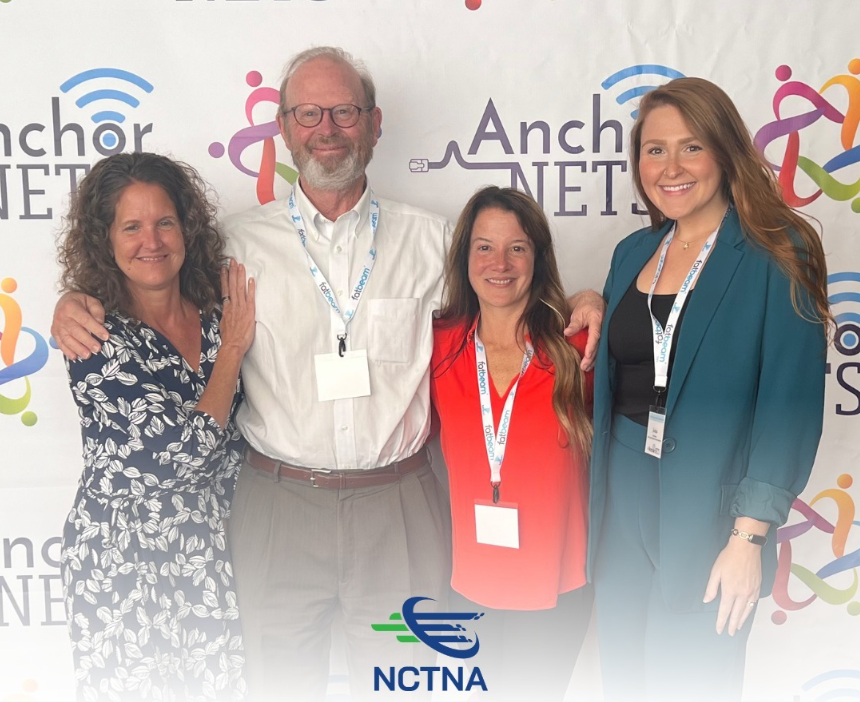From the Direct-Connection Monthly Newsletter. EDITION 1, 2024.
Meet our President, Dr. John Graham, and learn how a project to improve health departments’ ability to access Electronic Medical Record (EMR) Systems evolved into a state-wide network of fiber broadband called the NC Telehealth Network Association.

DR. JOHN GRAHAM
A VISIONARY LEADER
Dr. John Graham is an experienced and accomplished research economist, project manager, consultant, and a well-known leader of the greater public health community in North Carolina. He has spent time instructing, leading, and consulting at the University of Colorado, Duke, UNC Chapel Hill, and was also an independent consultant for many years. He’s known for several successful public health projects, his deep and unyielding passion for underserved and unserved communities, and for being the busiest semi-retired person most of his colleagues know.
To NCTNA and the healthcare providers we serve, John is known as our committed leader, constantly reminding us all of the purpose behind our work: to drive access to the best healthcare for all North Carolinians.
FROM PILOT TO PERMANENT
NCTNA’S STORY
The NC Telehealth Network Association as we know it today was born from a project John oversaw during his time at the UNC Gillings School of Public Health, where he served as the Deputy Director and a Senior Investigator at the NC Institute for Public Health. At the time, there was a statewide initiative called the North Carolina Incubators Project–a collaborative effort between health departments and the Institute to develop capacity-building projects that allowed health departments to do a better job with their public health responsibilities. One of the areas of focus for the capacity-building projects was information technology, which allowed John and team to focus on several technology-based solutions for health departments. One of those projects was the development of a network for health departments.
The Incubators Project was also done in conjunction with Meaningful Use Attestation, a project in which John served as the Public Health Liaison. This project was an incentive program to help healthcare providers, and in John’s case with the Gillings School, to help health departments adopt electronic health records.
“What we found was that in many of the rural health departments, they didn’t have the connectivity they needed to even be able to adopt electronic health records,” John said.
John would then make a phone call in 2010 that would begin to shape the organization we know today as NCTNA. The man on the other end of the line was Dave Kirby, a friend and colleague of his from his time at Duke. Dave was retired from Duke and had been working as a consultant in the healthcare space. They talked at length about the connectivity issue rural healthcare providers were facing. From there, John and Dave decided to start up an Internet Service Provider principally for small public health departments.
Between funding from the FCC’s pilot program for what is today the Healthcare Connect Fund, the Golden Leaf Foundation, and the Division of Public Health, they secured administrative funding for the ISP.
The organization began as a partnership of the Public Health Institute, Dave Kirby’s Consulting Firm, and the Cabarrus Health Alliance (CHA), the public health authority in Cabarrus County. They were selected as the initial fiscal partner due to their incredible health director and innovative configuration as a public health agency.
John and Dave began getting the health departments enrolled as members of their newly founded network and thought that once their needs were met, that would be the end of the project. As time went on, the two found that there was a real demand for the kinds of high-quality, direct-connection connectivity services that they were providing, and so it continued to grow and expand organically. From health departments, the ISP known as the North Carolina Telehealth Network (NCTN) at the time, connected community health centers, then clinics, then hospitals, and eventually health systems.
Almost four years ago, as John was beginning to retire from UNC, the organization decided to become an independent, financially self-sufficient non-profit, known today as the North Carolina Telehealth Network Association.
Today, NCTNA touts a robust offering of services and support to North Carolina healthcare providers. In light of the rapidly expanding and progressing landscape of broadband funding and digital inclusion over the last few years, NCTNA has taken on a massively important and mission-critical role as an advocate for providers by staffing the North Carolina Healthcare Broadband Coalition (NCHBC).
LOOKING TOWARD THE FUTURE FOR NCTNA

When asked what he’d like to accomplish before he “officially” retires, John said, “I know this will be long after I retire, and I know we play only a small part in this, but I’d like to continue the work through NCTNA and the NC Healthcare Broadband Coalition to end the digital divide in North Carolina.”
“While I think establishing our management team is a major accomplishment regarding NCTNA’s ongoing sustainability and capacity for contribution, I also consider this team to be remarkably good luck for me and NCTNA.
I’d worked with our current NCTNA CEO, Tracy Olson, on an earlier project. I recruited her, and fortunately, she chose to join us. In turn, she has recruited and trained our talented management team. She has also developed policies, processes, and technology solutions that make NCTNA one of the most productive organizations I’ve ever worked with.
This team has the horsepower for NCTNA to continue to thrive. As my colleague Dave has said, he wants to work himself out of a job. With this team, I think we’ve both made good progress toward that end.”
“I want to be confident that the healthcare community has been positioned as an effective player in the domain of broadband connectivity/infrastructure progress and funding allocation,” John said. “Most importantly, I want to ensure that long after I have retired, NCTNA stays true to it’s initial purpose of providing high-quality connectivity services to the underserved and unserved so that all North Carolinians may enjoy access to the best healthcare.”
NCTNA ACHIEVEMENTS JOHN IS MOST PROUD OF
- Enrolling over half of the state’s hospitals as NCTNA members.
- Receiving the North Carolina Technology Association’s Public Leadership Award, competing against industry giants like IBM and Cisco.
- Initiating programs that support healthcare providers, such as NCTNA’s Community Discount Guarantee Program and the new Carolina Connection Grant Program.
- Founding the North Carolina Healthcare Broadband Coalition, an advocacy group dedicated to promoting equitable access to broadband connectivity in unserved and underserved regions of North Carolina.
- Establishing and leading a member-led board that guides NCTNA’s work, ensuring alignment with the organization’s mission.
“We [NCTNA] started off as a broadband provider for health departments, and then we became a broadband provider for many of the healthcare organizations. Then we became a support for price-sensitive healthcare providers, a grant maker, and have now adopted advocacy as a major thrust. See…there are many, many other major opportunities out there to support healthcare providers and their patients, but it’s just a matter of keeping our eyes open for them.”






